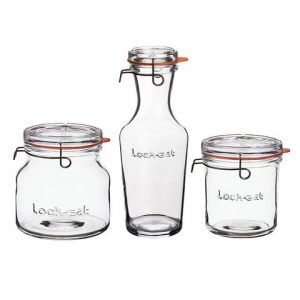As the demand for packaged food continues to grow, so does the need for efficient and profitable production processes. One key component in achieving these goals is high-quality gasket seals. A rubber gasket is essential for creating leak-proof closures on small glass bottles and other glass containers with lids used in food production. This blog post will explore maximizing efficiency and profitability using high-quality gasket seals in food production. So fasten your seatbelts because we’ll dive into everything you need to know.
Using high-quality gasket seals in food production can help companies achieve a more efficient and profitable manufacturing process. Manufacturers can reduce the risk of product contamination caused by leaks and spills by investing in quality rubber gasket. This not only helps to ensure that their products meet safety regulations but also minimizes waste during production. Gasket seals are essential for glass bottles used in the packaging of food and beverages. These containers must be sealed tightly to prevent air from entering, which could cause spoilage or affect the taste of the product inside. Using high-quality gaskets ensures these closures are leak-proof, preventing potential damage to the company’s product and reputation.
Moreover, using inferior quality gaskets may result in increased wear and tear on production equipment such as filling machines or capping machines due to improper sealing leading to downtime for maintenance repairs and reducing overall efficiency. High-quality rubber gasket seals maximize efficiency and profitability within food production processes. Companies that invest wisely in these critical components will benefit from reduced waste and decreased risk of contamination while avoiding unplanned downtime caused by equipment failure, resulting in better customer satisfaction through superior quality products delivered consistently over time at reasonable prices.
Why a Proper Gasket Seal is Critical for Food Safety
A proper gasket seal is critical for food safety because it ensures your product stays fresh and uncontaminated. Rubber gaskets are used to create an airtight seal between the lid of a container and its body, which prevents any harmful pathogens or bacteria from entering and spoiling the contents inside. Air can seep in without this seal, leading to oxidation, mold growth, and overall product degradation. When you’re dealing with perishable foods such as dairy products or meats, this can be especially dangerous since they have a shorter shelf life.
Furthermore, if you’re using small glass bottles or glass containers with lids to store food items like sauces or dressings containing oils or other liquids prone to leakage, maintaining proper seals becomes even more crucial. A leaking container makes a mess and increases the risk of contamination. In summary, ensuring that your glass bottles and containers with lids have properly sealed rubber gasket is essential for maintaining high food safety standards. Always take extra care when working with these containers to avoid potential risks associated with improper sealing methods.
A rubber gasket is commonly used in commercial kitchens and processing facilities because they are flexible enough to create a tight seal but durable enough to withstand frequent use. These seals must be regularly inspected and replaced as needed to prevent any breaches in their integrity. Even the most sanitary conditions can quickly become compromised without proper gasket seals. Contaminated products pose a health risk and can lead to legal liability issues for businesses. Investing in quality rubber gasket may seem like a small detail, but it can make all the difference in ensuring safe food handling practices.
A proper gasket seal is essential for ensuring food safety. This small component is crucial in keeping harmful contaminants from your food products, which can cause serious health issues if not adequately addressed. A rubber gasket is commonly used with lids in glass bottles and glass containers with lids to create an airtight seal that prevents air, moisture, and bacteria from entering the container. Food will quickly spoil or become contaminated by outside sources without this barrier.
Even the smallest oversight can have catastrophic consequences regarding food storage and transportation. A compromised gasket seal can lead to mold growth, bacterial contamination, or oxidation, negatively impacting your product’s color, taste, and texture. Therefore, you must choose a high-quality rubber gasket designed for food applications. These specialized materials offer superior resistance to extreme temperatures and chemicals, often in different foods. Maintaining proper hygiene practices during production – including checking the integrity of all sealing components – ensures consumers receive safe products every time they purchase them.
How Gasket Seals Ensure Quality Assurance in Food Processing
Gasket seals play a critical role in ensuring quality assurance in food processing. These small but mighty components create an airtight seal between the lid and container, preventing contaminants from entering or escaping. This is especially important when dealing with small glass bottles and containers with lids holding perishable items like food. Without proper sealing, bacteria can grow inside the container, causing spoilage and potentially leading to harmful health effects if consumed. Using gasket seals helps prevent this by creating an impenetrable barrier that keeps products fresh for longer periods.
Moreover, using high-quality rubber gaskets ensures that there is no risk of contamination due to chemical leaching or breakage during transportation or handling. Rubber gaskets are known for their durability, flexibility, and resistance against harsh chemicals in cleaning agents used during sanitation. Having reliable gasket seals on hand is essential for maintaining top-quality standards in food processing operations. With their ability to ensure an airtight seal and protect against spoilage-inducing factors like bacteria growth and chemical contamination, investing in these little yet powerful components will save money and maintain consumer trust by delivering safe products every time.
The Importance of Choosing the Right Gasket Seal for Your Food Industry Needs
When it comes to the food industry, there is no room for error. Every component used in food processing must meet strict standards and regulations to ensure the safety of consumers. This includes gasket seals used in various parts of food processing equipment. Choosing the right gasket seal can prevent contamination, increase efficiency, and protect your brand’s reputation. In this blog post, we will explore the importance of selecting the correct gasket seal for your specific needs regarding temperature, environment, product/industry standards, and compression set.
-
Temperature
Temperature plays a crucial role in the food industry. The gasket seal used must be able to withstand extreme temperatures, whether it is high or low. If the temperature is not considered when selecting a gasket seal, it can result in leaks, contamination, and even equipment failure. Different types of gasket seals are designed for specific temperature ranges. For instance, rubber-based materials such as EPDM and neoprene are ideal for lower-temperature applications, while silicone-based materials perform well under higher temperatures.
It’s essential to consider the operating temperature range and thermal cycling that may occur during use. Thermal cycling refers to repeated heating and cooling cycles that can cause expansion and contraction of the material over time leading to potential issues with sealing performance. Therefore, choosing a suitable gasket seal based on your equipment’s operating conditions will ensure maximum safety by preventing any unwanted incidents that could lead to product recalls or, worse yet, consumer health concerns.
-
Environment
Choosing the proper gasket seal for your food industry needs involves considering the environment where it will be used. The environment plays a crucial role in determining which type of gasket should be used. Firstly, suppose the environment is exposed to extreme temperatures, such as freezers or ovens. In that case, choosing a gasket that can withstand those temperatures without breaking down or losing its integrity is essential. Silicone seals are often recommended for these environments because they have excellent thermal stability and flexibility.
Secondly, if the environment is wet or subject to frequent wash-downs with water or other liquids, you’ll want to choose a gasket that is resistant to moisture and doesn’t absorb liquids easily. EPDM (ethylene propylene diene monomer) rubber is an ideal choice for this type of application because it has good resistance against both hot and cold water. Some environments may require specific materials due to regulations around contact with certain chemicals or allergens. In these cases, you must ensure that your chosen gasket material complies with relevant safety standards and product/industry regulations.
-
Product/Industry Standards
When choosing the proper gasket seal for your food industry needs, you cannot ignore the importance of product and industry standards. These standards are set by regulatory authorities to ensure that all products and materials used in the food industry meet specific requirements. One of the critical factors determining which gasket seal is suitable for your business is its compliance with FDA regulations. The Food and Drug Administration (FDA) regulates all materials involved in contact with food, including gaskets, ensuring they do not contain harmful chemicals that can contaminate or alter food quality.
Additionally, other certifications, such as NSF International Certification, ensure safety and performance criteria when using a particular type of sealing material. Maintaining consumer confidence in your brand’s commitment to producing safe products is essential. Keeping up with these crucial requirements means ensuring proper labeling of products containing allergens and having adequate traceability systems alongside meeting various environmental laws. This makes selecting a reliable supplier who understands these standards critical so that you can make an informed choice on which gasket seals best suits your needs while prioritizing safety within production processes.
-
Compression Set
Choosing the proper gasket seal for your food industry needs is crucial to ensuring a safe and compliant operation. By considering factors such as temperature, environment, product/industry standards, and compression set, you can make an informed decision that will save you time and money in the long run. The compression set is another essential factor when selecting a gasket seal. This refers to how well a material maintains its shape after being compressed. In food processing operations where equipment may undergo frequent cleaning or maintenance, gaskets must retain their original shape even after repeated compressions.
Using low-quality sealing material with a poor compression set can lead to leaks, contamination of products or processes, and ultimately loss of revenue due to downtime or recalls. Therefore investing in high-quality seals with superior compression set properties will not only improve efficiency but also ensure safety practices are upheld. Selecting the right gasket seal for your food industry needs requires careful consideration of various factors, including temperature resistance, environmental conditions, compatibility with product/industry regulations/compliance requirements, and compression set performance. By prioritizing these aspects during the selection process, you can effectively reduce risks associated with failures while increasing productivity levels throughout production cycles which should always be your primary goal.
Last Words
High-quality gasket seals are an absolute must-have when it comes to ensuring efficiency and profitability in food production. Companies can significantly increase their output by choosing the right rubber gasket while minimizing waste and downtime.






